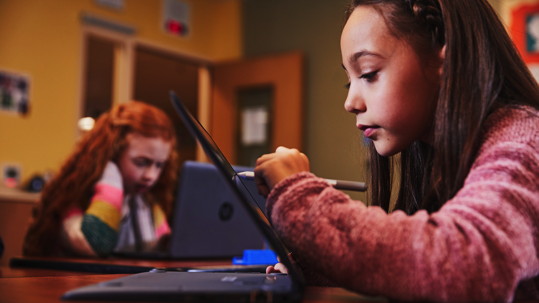Set the stage
Our students will graduate into a world we don’t yet know, into a workforce that demands skills for jobs that don’t yet exist. How can we best serve our students? We must equip them to be life-long learners. By anticipating the future through research and studies and channeling that knowledge into the everyday classroom, we serve our next generation of students.
"By the time kindergartners of today become the graduates of 2030, the world will be vastly different from anything previous generations have experienced."
Barbara Holzapfel, GM Microsoft Education
Flint Cultural Center Academy is just one of many schools with visionary leaders who are using thoughtful approaches and innovative technology to evolve traditional education experiences for their students. When you play this video (2:30), note things that leaders and educators are doing to create innovative spaces and learning experiences that create the feeling that one student describes as, "I’ve never been to a school like this ever. It actually feels like my home now."
Overview of the module
During this module, you learn:
- The current and future environments of education as perceived by several research studies.
- How to maximize these research findings into actionable change in education to benefit the learners of the future.
The module is organized into five units:
- Setting the stage
- The world in 2030 and beyond
- Essential skills for life ready learning
- Transforming learning through personalization
- The role of educators and leaders in shaping the future
Each unit is divided into three primary parts; what the research says, what it can look like with real-world examples, and actions you can take to apply this learning.

Overview of resources
In partnership with this module, there's also a resource page that highlights important tools you can use to learn more about the topics covered. This resource page includes preliminary readings offering context for the examples you explore during the module, as well as actions you can take to shape the future of teaching and learning.
Throughout the module, you find additional resources and information in sections titled “Learn more.” These are intended to help you continue learning and reflecting on the content in the module.
Options for engagement
This module offers you multiple ways to engage and learn.
Self-guided
This approach offers a way to take the module on your own time, documenting your learning and using the questions at the end of each section to reflect.
With a team
For a communal experience, take this module with a team, whether that is your professional learning community (PLC) or a community of practice (CoP). This team can be made of people you see face to face, or people who you connect with virtually.
If you choose to engage in the module with a team, set norms for communicating both synchronously (during group meetings) and asynchronously (outside of group meetings). Agree upon communication and meeting tools that each team member can access and navigate. Use the reflection questions at the end of each unit to engage in discussion with your team.
Documenting your learning
As you explore the information in this module, notice opportunities to pause and reflect on the information you read, watch, and engage with. You can also use tools to create artifacts of learning.
OneNote
Use OneNote to set up a notebook with sections for each part of the module. Document your learning through artifacts by adding notes, images, videos, and links to resources you’d like to explore further.
Microsoft Teams
Teams is a perfect option for connecting with your PLC or CoP while you engage in the module. Use it for synchronous and asynchronous discussion and reflection as well as resource sharing among your team.